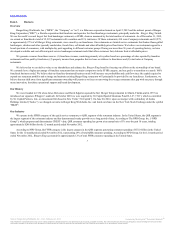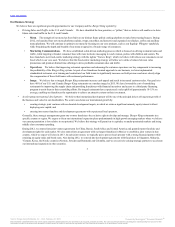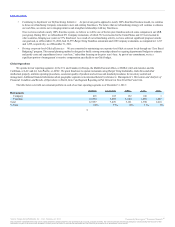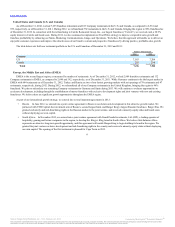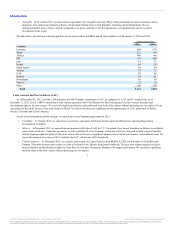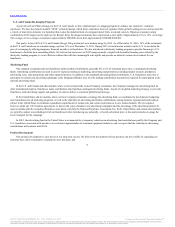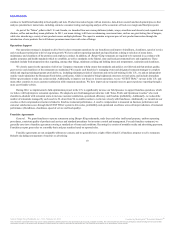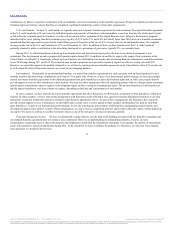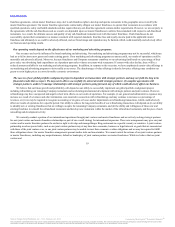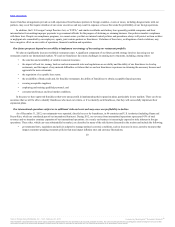Burger King 2012 Annual Report Download - page 14
Download and view the complete annual report
Please find page 14 of the 2012 Burger King annual report below. You can navigate through the pages in the report by either clicking on the pages listed below, or by using the keyword search tool below to find specific information within the annual report.
Table of Contents
service marks generally are valid as long as they are used and/or registered. We also have established the standards and specifications for most of the goods
and services used in the development, improvement and operation of restaurants. These proprietary standards, specifications and restaurant
operating procedures are trade secrets owned by us. Additionally, we own certain patents relating to equipment used in our restaurants and provide proprietary
product and labor management software to our franchisees. Our patents are of varying duration.
We operate in the FFHR category of the QSR segment of the broader restaurant industry. We compete in the United States and internationally with many
well-established food service companies on the basis of product choice, quality, affordability, service and location. Our competitors include a variety of
independent local operators, in addition to well-capitalized regional, national and international restaurant chains and franchises. In the FFHR industry our
principal competitors are McDonald’s Corporation, or McDonald’s, and The Wendy’s Company, or Wendy’s, as well as regional hamburger restaurant
chains, such as Carl’s Jr., Jack in the Box and Sonic. We also compete for consumer dining dollars with national, regional and local (i) quick service
restaurants that offer alternative menus, (ii) casual and “fast casual” restaurant chains and (iii) convenience stores and grocery stores. Furthermore, the
restaurant industry has few barriers to entry, and therefore new competitors may emerge at any time.
As a manufacturer and distributor of food products, we and our franchisees are subject to food safety regulations, including supervision by
the U.S. Food and Drug Administration and its international equivalents, which govern the manufacture, labeling, packaging and safety of food. In addition,
we may become subject to legislation or regulation seeking to tax and/or regulate high-fat, high-calorie and high-sodium foods, particularly in the United
States, the United Kingdom and Spain. Certain counties, states and municipalities, such as California, Vermont, New York City, and King County,
Washington, have approved menu labeling legislation that requires restaurant chains to provide caloric information on menu boards, and menu labeling
legislation has also been adopted on the federal level. Regulators in Canada and in other countries are proposing to take steps to reduce the level of exposure to
acrylamide, a potential carcinogen that naturally occurs in the preparation of foods such as french fries.
We and our franchisees are subject to U.S. and international laws affecting the operation of our restaurants and our business. Each
of our restaurants must comply with licensing requirements and regulations by a number of governmental authorities, which include zoning, health, safety,
sanitation, building and fire agencies in the jurisdiction in which the restaurant is located. Our restaurant operations are also subject to laws governing union
organizing, working conditions, work authorization requirements, health insurance, overtime and wages.
We and our franchisees are subject to laws relating to information security, privacy, cashless payments and consumer credit, protection and fraud. An
increasing number of governments and industry groups worldwide have established data privacy laws and standards for the protection of personal
information, including social security numbers and financial information.
Our franchising activities are subject to the rules and regulations of the Federal Trade Commission (“FTC”) and various state laws and similar foreign
agencies. The rules of the FTC and those of a number of states in which we are currently franchising regulate the sale of franchises and require registration of
the franchise disclosure document with state authorities and the delivery of a franchise disclosure document to prospective franchisees. We are currently
operating under exemptions from registration in several of these states based upon our net worth and experience. These state laws often limit, among other
things, the duration and scope of non-competition provisions, the ability of a franchisor to terminate or refuse to renew a franchise and the ability of a
franchisor to designate sources of supply.
13
Source: Burger King Worldwide, Inc., 10-K, February 22, 2013 Powered by Morningstar® Document Research℠
The information contained herein may not be copied, adapted or distributed and is not warranted to be accurate, complete or timely. The user assumes all risks for any damages or losses arising from any use of this
information, except to the extent such damages or losses cannot be limited or excluded by applicable law. Past financial performance is no guarantee of future results.


